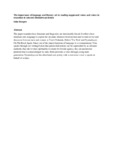Please use this identifier to cite or link to this item:
https://cris.library.msu.ac.zw//handle/11408/1911Full metadata record
| DC Field | Value | Language |
|---|---|---|
| dc.contributor.author | Hungwe, Elda | - |
| dc.date.accessioned | 2017-03-07T14:39:35Z | - |
| dc.date.available | 2017-03-07T14:39:35Z | - |
| dc.date.issued | 2013-05 | - |
| dc.identifier.uri | https://www.researchgate.net/publication/271025006 | - |
| dc.identifier.uri | http://hdl.handle.net/11408/1911 | - |
| dc.description.abstract | The paper examines how literature and linguistics are inextricably linked. It reflects how literature uses language to expose the dynamic relations between men and women in the land discourse between men and women in Vera's Nehanda, Hoba's 'The Trek' and Nyamubaya's On The Road Again. Since one of the major functions of language is to communicate, Vera speaks through her writing/fiction that patriarchal notions can be superseded by an ultimate authority thus she invokes spirituality to create the female agency, thus an uncontested platform that is acknowledged by men. Hoba provides a voice through young male generation. Nyamubaya on the other hand uses poetry with a conscious voice to speak on behalf of women. | en_US |
| dc.language.iso | en | en_US |
| dc.relation.ispartofseries | Journal of Language and Literature;Vol. 4 No. 1; p.41-43 | - |
| dc.subject | Literature and linguistics | en_US |
| dc.title | The importance of language and literary art in reading suppressed voices and voices in transition in selected Zimbabwean fiction | en_US |
| dc.type | Article | en_US |
| item.openairetype | Article | - |
| item.fulltext | With Fulltext | - |
| item.languageiso639-1 | en | - |
| item.openairecristype | http://purl.org/coar/resource_type/c_18cf | - |
| item.cerifentitytype | Publications | - |
| item.grantfulltext | open | - |
| Appears in Collections: | Research Papers | |
Files in This Item:
| File | Description | Size | Format | |
|---|---|---|---|---|
| The importance of language and literary art in reading suppressed voices and voices in transition in selected Zimbabwean fiction.pdf | Abstract | 4.8 kB | Adobe PDF |  View/Open |
Page view(s)
142
checked on Jan 15, 2026
Download(s)
26
checked on Jan 15, 2026
Google ScholarTM
Check
Items in MSUIR are protected by copyright, with all rights reserved, unless otherwise indicated.



